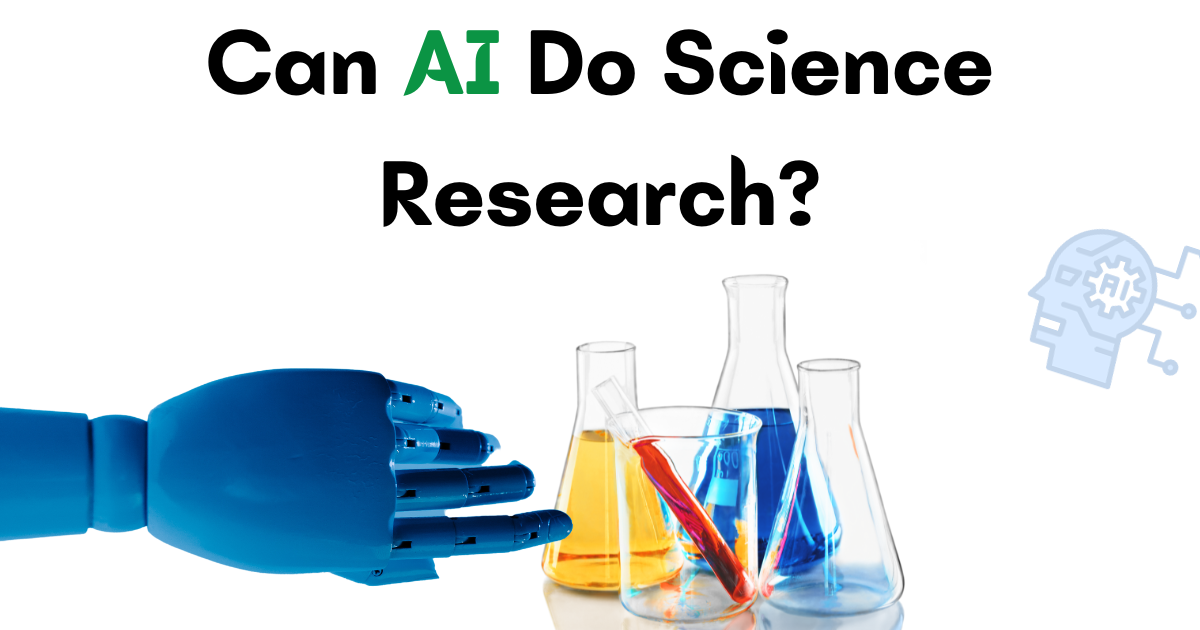Can AI do Science Research? (Let’s Find Out)

Artificial intelligence (AI) has the potential to revolutionize science research in numerous ways. AI-powered tools are being developed to more accurately predict extreme weather events, allowing for better preparation and evacuation.
In the field of medicine, AI models have been used to identify antibiotics and control plasma fusion reactions. AI can assist in literature reviews by generating succinct and accurate summaries of existing research.
It can also contribute to hypothesis generation and experimental design by predicting patterns and generating new hypotheses that humans may not have considered.
AI can accelerate data analysis and experimentation, allowing for faster and more extensive research. Additionally, AI can contribute to replicability and trust in science by lowering the cost and effort of running experiments.
However, it is important to recognize the limitations and biases of current AI models and to ensure transparency in the research process.
AI has the potential to greatly enhance the scientific process and lead to new discoveries.
AI’s Impact on Science Research
AI is already making significant contributions to science research across multiple disciplines. With the development of AI-powered tools, researchers are able to harness the potential of AI in various ways.
One notable application is in the field of extreme weather prediction. By analyzing vast amounts of data, AI models can accurately predict and track severe weather events, enabling better preparedness and more effective evacuation plans.
Another area where AI is making strides is in medicine. AI models have been used to identify potential antibiotics, contributing to the fight against antibiotic resistance. AI is being utilized to control plasma fusion reactions, a crucial aspect of developing sustainable and clean energy sources.
AI is not only aiding in the analysis of data but also in the literature review process. By generating concise summaries of existing research, AI can assist researchers in quickly identifying relevant papers and extracting key information.
AI has the potential to revolutionize hypothesis generation and experimental design. By detecting patterns and generating novel hypotheses, AI can enhance the creativity and efficiency of the scientific process.
Despite its promise, it is essential to acknowledge the limitations and biases that exist within current AI models.
Researchers must remain vigilant and ensure transparency in the research process. By addressing these challenges, AI has the potential to accelerate scientific advancements, leading to new discoveries and a deeper understanding of the world around us.
| AI-powered Tools | Impact |
|---|---|
| Extreme Weather Prediction | Better preparation and evacuation plans |
| Medicine | Identification of antibiotics, control of plasma fusion reactions |
| Literature Reviews | Efficient paper selection and accurate summaries |
| Hypothesis Generation and Experimental Design | Enhanced creativity and efficiency in scientific process |
AI’s impact on science research is already evident in various domains. From predicting extreme weather events to aiding in literature reviews and experimental design, AI-powered tools are revolutionizing the scientific process.
However, it is crucial to address the limitations and biases inherent in AI models to ensure the integrity and transparency of research.
With continued advancements, AI has the potential to greatly enhance scientific discoveries and our understanding of the world.
Future of AI in Science Research
The future of science research holds great promise with the continued integration of AI technologies. Artificial intelligence has the potential to accelerate research in various ways, particularly in the areas of data analysis and experimentation.
By harnessing AI-powered tools, scientists can analyze vast amounts of data at unprecedented speeds, enabling them to uncover patterns and insights that were previously inaccessible.
Moreover, AI can greatly enhance the replicability of scientific studies. By automating experimental processes, AI can reduce the cost and effort required to conduct experiments, making it easier for researchers to reproduce and verify results.
This increased replicability fosters trust in the scientific community and allows for more robust and reliable findings.
Furthermore, the integration of AI technologies in science research can lead to exciting new discoveries. AI models have the capability to generate novel hypotheses and identify research gaps that human researchers may have overlooked.
This creative potential of AI opens up new avenues for exploration and innovation across various scientific disciplines.
However, it is crucial to recognize the limitations and biases of current AI models. As with any technology, AI is not infallible, and its outputs must be critically evaluated.
Transparency in the research process is essential to ensure that AI algorithms are accountable and that potential biases are identified and addressed.
FAQ about Can AI do Science Research?
Can AI conduct science research?
Yes, AI has the potential to revolutionize science research in several ways by assisting in various tasks and processes.
How can AI impact science research?
AI-powered tools can enhance science research by accurately predicting extreme weather events, aiding in medicine through identification of antibiotics and control of plasma fusion reactions, assisting in literature reviews, hypothesis generation, experimental design, and accelerating data analysis.
What are the limitations and biases of current AI models in science research?
It is important to recognize that current AI models have limitations and biases. Transparency in the research process is crucial to mitigate these issues and ensure the reliability of the findings.
What is the future potential of AI in science research?
AI is expected to accelerate research by speeding up data analysis and experimentation. It can also contribute to replicability and trust in science by reducing the cost and effort of running experiments. Furthermore, AI has the potential to lead to new discoveries and advancements in various scientific fields.
Wrapping things up, the future of AI in science research is filled with immense potential. Through its ability to accelerate research, enhance replicability, and foster new discoveries, AI can revolutionize the scientific process.
It is up to scientists and researchers to responsibly harness AI technologies and collaborate with them, leveraging their capabilities to drive groundbreaking advancements for the benefit of society.
